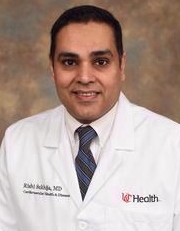Heart disease does not usually develop quickly - instead, it is a progression and result of many small lifestyle decisions over time. Rishi Sukhija, MD, interventional cardiologist and assistant professor in the Department of Cardiovascular Disease at the University of Cincinnati College of Medicine discusses the types of heart disease, the top hazards to your heart health and the five steps you should take to strengthen your heart to avoid heart disease. Dr. Sukhija, also provides answers to the most popular questions about heart health.
Types of Heart Disease
Heart disease describes a range of conditions that affect your heart. The main types of heart disease include:
- Coronary artery disease: When the major blood vessels that supply your heart with blood, oxygen and nutrients become damaged or diseased.
- Ischemic heart disease: Caused by narrow heart arteries that restrict the amount of blood and oxygen that reaches the heart muscle.
- Congenital heart disease: Describes at least one problem with the structure of the heart. Also known as a congenital heart defect, this birth defect can change the way the blood flows through your heart.
- Rheumatic heart disease: Damage to the heart valves caused by rheumatic fever or streptococcal infection such as strep throat or scarlet fever.
- Heart arrhythmia: An irregular heartbeat caused when the electrical signals that coordinate the heart's beats don't work properly. An arrhythmia could be too fast (tachycardia), too slow (bradycardia) or irregular.
- Cardiomyopathy: Affects the heart muscle and makes it harder for your heart to pump blood to the rest of your body.
- Heart infection: When bacteria, viruses and fungi infect your heart. Types of heart infections include endocarditis, myocarditis and pericarditis.
Heart disease includes problems related to a process called atherosclerosis when plaque builds up in the walls of the arteries, making it harder for blood to flow through. If a blood clot forms, it can block the blood flow and cause a heart attack or stroke.
Top Hazards to your Heart Health
Behaviors and risk factors that contribute to heart diseases include
- Smoking.
- Excess weight.
- Certain types of red meat.
- Soda.
- Excessive alcohol use.
- Sitting for hours.
- Poor sleep quality.
Many forms of heart disease can be prevented or treated with healthy lifestyle choices. Read on for the top steps you should take to strengthen your heart and avoid heart disease.
5 Steps to Strengthen Your Heart and Avoid Heart Disease:
- Adopt a heart healthy diet.
Diets that have been studied and promoted by the American Heart Association focus on a low-fat, low-carb plan, as well as avoidance of processed foods. Eat as many natural fruit and vegetables as possible, and avoid processed carbohydrates, sugars and fatty foods, especially those that contain highly processed saturated fats. Attention to dietary habits like these ensure your body has vital nutrients, as well as the ability to maintain a healthy weight and body mass index (BMI), which keeps many other risks associated with heart disease away. - Incorporate exercise into your daily routine.
Focus on simple exercises that get you moving and increase your heart rate. Start slow, set a goal and work your way up to that goal. Begin by walking 10-15 minutes three times a week, then, increase walk time by 15 minutes, or increase distance or pace. Biking and swimming are also great activities for beginners. It’s important to get yourself acclimated to activity as a routine—listen to your body and don't overdo it. Do something that you enjoy so you’re more likely to sustain the habit. - Get regular heart screenings
The best thing to do is to talk to your doctor about your risk factors and any symptoms you may have. A family history, high cholesterol, diabetes or high blood pressure may make you a candidate for a stress test. - Reduce stress as much as possible.
Increased stress generally causes inflammation in the body, which is a risk factor for heart disease. It is very important to manage your stress, and although everyone has different stressors, there are always ways to reduce the impacts of stress. - Increase your sleep.
Sleep provides time for the body to restore and recharge. Getting seven to eight hours of sleep each night is very important for our overall health, including the heart. Insufficient or fragmented sleep can contribute to problems with blood pressure and heighten the risk of heart disease, heart attacks, diabetes and stroke.
Taking charge of your health with these five healthy living tips is the best way to delay or avoid heart disease. You can also create a prevention plan with your healthcare providers (doctors, nurses, pharmacists, registered dietitians or other professionals).
Answers to the Most Popular Heart-Health Questions from Dr. Sukhija
What is/classifies as a weak heart?
“The heart is a pump, and you can think of it like an engine in a car. The heart’s job is to pump blood to the entire body. When the heart pump is weak, it is not able to supply adequate blood to the body and it can lead to pooling of blood in the lungs. This condition is known as Congestive Heart failure.”
How can someone strengthen their heart muscle?
“A good diet, exercise and controlling your blood pressure and cholesterol all help promote a strong heart and prevent heart disease. For people who already have a weak heart, low sodium intake, proper exercise and compliance with medications can all prevent more problems. Developing a plan with your healthcare provider also plays a key role in strengthening your heart.”
What is the biggest misconception about heart health?
“One of the biggest questions I am asked after someone has a heart attack is, ‘how does this limit me for the future?’ Some people think that because they had a heart attack, they really need to limit themselves in terms of what they do. That is not the case. As long as a person makes a good recovery, having a heart attack should not limit them at all. In fact, I encourage them to use that as a call to action for themselves to become more active in cultivating a healthier lifestyle.”
What’s the latest advice on aspirin treatment?
“You are able to use aspirin therapy when you have had a heart attack, have had stents placed or had bypass surgery — really, anyone with a history of coronary artery disease. For patients who do not have a history of heart disease, however, recent data has shown that aspirin may not be much benefit unless they have specific indications. For example, those who have had a stroke, who have peripheral vascular disease or who have blockages in the arteries in the legs or arms.”
Are there any new treatments for heart disease?
“New medications have recently been approved for treating heart disease. I believe we can really make a difference in people's lives because of the medications we have available and because of the advanced testing modalities and treatments that we have available today. Receptor agonist class medications were originally diabetes medications, but recently have been found to be extremely beneficial in patients with heart failure – even in the absence of diabetes.
The Food and Drug Administration (FDA) recently approved medications within a new class of drugs called angiotensin receptor neprilysin inhibitors (ARNI) to treat patients with chronic heart failure. Studies have shown the ARNI medications were associated with reductions of mortality and morbidity, and it t is expected to become a core therapeutic component of chronic heart failure in the near future. Before these medications were available, core therapeutic medications for heart failure included angiotensin-converting enzyme (ACE) inhibitors and aldosterone receptor antagonist (ARA) medications.”
UC Health delivers innovative, compassionate and leading-edge cardiological care to patients in the Greater Cincinnati-Northern Kentucky region and beyond. We can help you navigate testing, treatment and rehabilitation for heart and vascular disease. To learn more or to schedule an appointment with one of our cardiology experts, call 513-475-8521.

